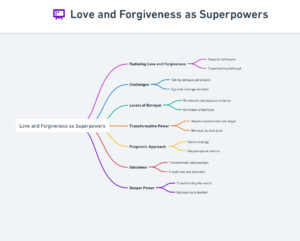Love and Forgiveness is our superpower.

We have the ability to radiate love and forgiveness towards those who would or are betraying us.
And it can be difficult if you take betrayal personally, if you believe that there really are others outside of some reflection of you.
If you land into the realm of egos and law of the jungle, eye for an eye type of thinking, it can be hard to really forgive and radiate love towards one who has rooted against you.
And there are levels to betrayal which can extend into the taking of a life or other forms of violence, both emotional and physical, that make this magic trick of transformation of a situation through forgiveness and love much more difficult to pull off.
However, even in extreme cases, it’s possible, and even in extreme cases (or maybe even especially), it’s necessary.
There is no world where walking around full of resentment makes things better.
And anger and rage towards someone or towards a situation only feel like they are in someway protecting you, when in actual fact, they are the actual damaging agent of whatever form of betrayal you are facing.
Betrayal itself works like a bonding agency. Soul glue, you could call it.
It puts the object of betrayal (or the one who betrayed you) in the front row of your psyche and then demands your obsession, your focus, your potential, your time. It drains you like a nefarious actor that got all your information and has stolen your identity.
Your anger and rage serve nothing but to grant him permission to access your soul over and over again.
Or, if we can look at it like a video game,
Or a game, which is helpful because in a game it’s less personal automatically. After all, it’s just a game.
And in the game of betrayal, the prize and the bounty is one’s attention.
So far from your anger, rage, and obsession protecting you as a reaction to betrayal, they actually only serve to hand over the keys to your soul to another.
This also serves to make your shift to radiating love and forgiveness not too hyper religious or some kind of angelic pose, but rather pragmatic gameplay.

——-2
Which is helpful in cultivating behavior like this which at first glance might not be so easy or natural, particularly in the fresh pain of betrayal.
Another reason why gamifying all this and removing as best we can emotions from the equation.
The Hooponopono mantra is a great go-to forgiveness hack.
It overrides our limited beings. It hacks our emotions in a positive way.
It elevates our souls. We bring egos to the party dragging and kicking.
The ego would much prefer rage and revenge fantasy, and will even manage to slip those through the cracks when you attempt to practice forgiveness.
But then act as an alarm bell.
Your mind has gone off the rails and is attempting to indulge in something you could never really indulge in.
Because what forgiveness shows us is that we can actually affect the heart of another through the power of the space we hold for them inside of us.
Our thoughts and feelings transmit, and thus have the power to transform.
Depending on where you are on your understanding of things, this will be obvious to some and less so to others.
Before I discovered Hooponopono, this might have been something I understood as an abstract concept or a kind of hippy notion that we aim for in some far-out ideal.
But I don’t think the actuality of it really ever occurred to me, and certainly was nothing I had witnessed before.
But I have seen this work over and over again in my own life.
Relationships that were beyond contentious, which I worked diligently on applying this gamified forgiveness on, I watch them transform over the course of a few months (it takes time), sometimes years. Into peaceful and even loving relationships, often in ways where no dramatic resolution is even needed.
They seem to just veer into peace. And it’s not nefarious to think you’ve somehow cracked a secret code in the matrix.
But that is pretty much what has happened.
Your reward is freed up time and attention that you can now deploy towards working on a vision rather than some diabolical revenge fantasy which will never play out anyway and make you think of yourself like a lunatic.
Turned out by Satan. Satan’s bitch.
3

This points to a deeper power we all have to transform the state of our world through the power of our minds and controlled and consistent attention.
Once we apply this to betrayal, it’s the greatest teacher.
Because betrayal demands attention and even obsession.
And so it makes the practice of forgiveness or sustained attention necessary, and innately teaches us about perseverance.
The obsessive nature of betrayal, and especially when aligned with dedication to observing our own thought life, becomes a kind of de facto boot camp for the power our perceptions wield.
Our refusal to play into a victim narrative, our dedication to perceiving everything that happens in our field of consciousness our responsibility,
And the results that arise from this a little while later.
It’s a stunning revelation about our own ability to create the reality we live in.
We don’t get any points for being right, and nobody cares about the dramas in any of our lives beyond fodder for gossip that takes us out of the drama in our own.
The only points we get are peaceful relationships with those who are in our lives regardless, or minimal attention to the attention vampires left floundering on the periphery.
We don’t allow the indulgence of thinking negatively about others, not from some elevated space of moral superiority but rather an understanding about attention and energy and wanting our own existence to be as merciful and as graceful and full of positive emotions as our souls will allow.
Player one, peace on earth.
We gamify forgiveness, and we set ourselves free to break the matrix.


